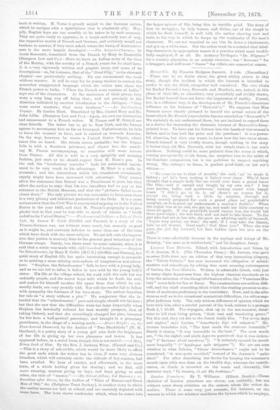Luciani Vera Historic. Edited, with Introduction and Notes, by C.
S. Jerram, M.A. (The Clarendon Press.)—Mr. jerram, who gave us some little time ago an edition of that very interesting allegory, the "Tabula Cebetis," has now increased the obligation of school- masters and schoolboys, by editing that most amnsing extravaganza of Lucian, the Vera Historic. Written in admirable Greek, with just so many slight departures from the highest classical standards as to keep the attention of the thoughtful learner alive, the "Veracious His- tory" never fails for fun or fancy. The constructions are seldom diffi- cult, and the chief stumbling-block which the reading presents to stu- dents of moderate proficiency is the vocabulary. Here, and in the allu- sions as well as in the occasional syntactical difficulties, the editor sup- plies judicious help. The only serious difference of opinion which we have with him, after a careful perusal of the book, relates to a passage Book 2, I. 10-20. The voyagers, shut up in the sea-monster, deter- mine to kill their living prison, "their vast and wandering grave." For this end, they set fire to the forest inside him, "For seven days and nights," says Lucian, "'Avairenress 4x* otaisharos." Mr. Jerrarn translates this, "The heat made the creature insensible." Surely it means, "It was insensible to the heat." The next words are, "On the eighth and ninth days we perceived that it was sicken- ing" ZuvfEpey atm; porrapros 1. "It certainly opened its mouth more languidly" (" '4747:Epos yoliv ?a4xao1ce "). We are not sure whether in what follows, " TiAeov arm vbcpcoTo " ought not to be translated, "it was quite mortified," instead of Mr. Jerram's " quite dead." For after describing the device for keeping the creature's mouth open (this was done on the twelfth day, whereas the mortifi- cation, or death, is recorded on the tenth and eleventh), the narrator says, "Tfiitriot;ery, eb /.411, Sian &eavistei."


































 Previous page
Previous page